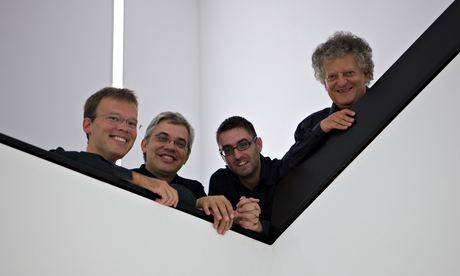
Over the past four decades, the Arditti Quartet have collaborated with almost all the great composers of our time, many of whom, from Elliott Carter to Karlheinz Stockhausen, Giacinto Scelsi to Harrison Birtwistle, have written pieces specifically for the group. But none of the Ardittis' associations have been as long-lasting and productive as that with Brian Ferneyhough. Since they gave the first performance of his Second String Quartet in 1980, Ferneyhough has composed another four full-scale quartets (one of them, the Fourth, involving a soprano setting of a deconstructed Ezra Pound poem) and three smaller works, all for them. Alongside Carter's five quartets, these works are arguably the most important contributions to the quartet repertoire since Bartók, and a complete recording of them is the best possible way for the Arditti to mark their 40th anniversary this year.
There are times, in fact, when the Ardittis' whole style of playing contemporary music seems to have been conditioned by their approach to Ferneyhough's bewilderingly intricate writing, and the negotiations it demands between what the composer specifies with his minutely precise scores and what is humanly possible. The performances on these three discs are wonderfully authoritative. They also include Ferneyhough's first exploration of the quartet medium in the huge Sonatas for String Quartet of 1967, as well as Dum Transisset I-IV, one part of a much larger set of chamber pieces based on music for viol consort by the Tudor composer Christopher Tye, and Exordium, written for Carter's 100th birthday in 2008.
What they never forget, either, is that beneath all the complexity there is a layer of intense expressiveness that drives Ferneyhough's music. It sometimes seems as if its convulsive surfaces are evidence of the seismic clash between intellectual rigour and the emotional directness beneath, which occasionally erupts in gestures of almost romantic expansiveness. Every one of these works repays repeated listening; it's not always easy going, but it's certainly never dull.
• This article was amended on 16 April. It originally stated that Ferneyhough composed two string trios for the Arditti Quartet. This has been changed.

